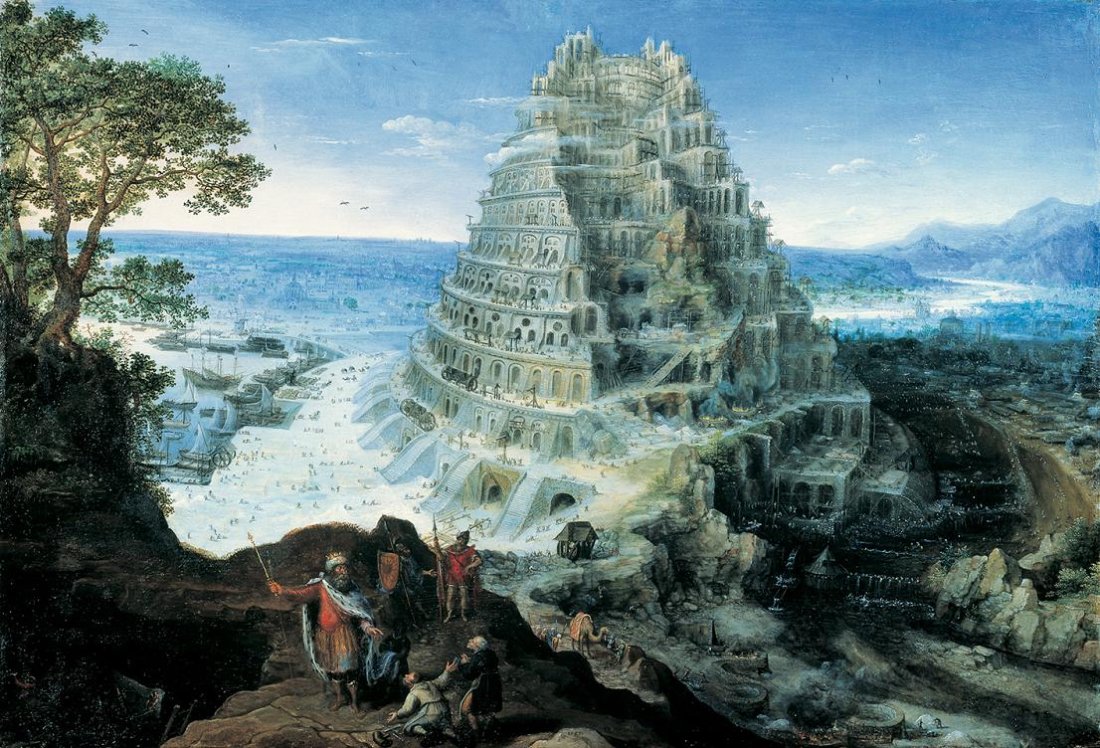Chapter 11 starts with the comment that the whole earth had one language (v.1). The people
migrated from the East and settled in the land of Shinar, an ancient name for
the land of the Tigris and Euphrates Rivers, known to us more familiarly as
Mesopotamia or Babylonia (Isa 11:11). There is a single group of people here who are migrating together as a
large family. They have "one
language... the same words" (v.1), yet fear being "scattered"
(v. 4). The tower portrayed in this story is not itself unusual culturally. Yet God acts so that they will be "scattered" (v.8). These people decided to build a city and a "tower." The idea of building a city was not new (note 4:17 ) and may simply have represented the movement from nomadic to sedentary culture. Since there is no real hint in that direction in the text, it should not be read as any critique against urban life or the development of technology (note 4:17-22). The issue here is not the building of the tower itself, but the reasons for building it. The first goal was to "make a name for ourselves," with the longer range purpose that they would not "be scattered abroad upon the face of the whole earth" (v. 4).
The concept of having a "name" in the ancient world was close to what we mean by the same expression. A person’s name not only represented the person and their reputation, but it also communicated something about the character of the person (cf. Prov 22:1). The implication here is that the people are depending on themselves to define who they are, and what they are about in the world. This stands in stark contrast to God’s promise to Abraham in the following chapter: "I will... make your name great" (12:2). The implication is that God is the one who should make their name great (cf. 2 Sam 7:9, 23; I Kings 1:47 ). This introduces an element of self-sufficiency and self interest here.
Their intentions were also in direct contrast to God's command to spread and fill the earth. They instead decided to stay there "lest we be scattered" (v4). The people were afraid of division. Their solution? Take matters into their own hands. They proposed a project: A city, a tower, a name. And yet, since early in the creation story, this has been God’s stated purpose for humanity: that they would "fill the earth" (1:28 , cf. 9:7).
The next part of the passage is from the perspective of God. There is a certain sarcastic tone in verse 5 that serves to highlight their arrogance: "The Lord came down to see the city and the tower." They intend to build a tower to reach into the heavens to make a name for themselves. The irony is that God can’t even see this tower. He must come down and find this puny tower that the mortals had built. From high above in the heavens, God had to stoop low to see how their little project was progressing. The implication here is that these people aren’t ever going to become gods.
God sees that they are "one people... one language" (v.6). Their unity was real. It had limitless potential. There was only one problem. It was all man-made. As is obvious from the response of God, the problem here is not unity itself. The telling theological commentary of verse 6 provides the crux of this passage: "this is only the beginning of what they will do; nothing that they propose to do will now be impossible for them." This reveals that the issue here is not unity, but is really one of arrogance and pride. The unity of these people is not something positive, because they are unified around the wrong center. The focus of their unity is their own ability to establish themselves in the world apart from God (note the same idea in a scathing prophetic denunciation in Habakkuk 1:11 , 16). Here echoes the same problem that was evidenced in the Eden story: they aspire to become like God, themselves establishing their place in the world and implementing their own rules by which they live in that world.
At this point, God entered the picture and confused their language so they could no longer communicate with each other (v. 7). The very thing they feared most, division, dispersal, a half-built city, not a trace of a tower, and a name that means “confusion.” What man makes, God unmakes. Man-made unity, God-made division. Fear of division (real or imagined) is a terrible reason to unite. It will never produce anything more than a man-made unity. True unity isn’t the product of man’s proposals, but of God’s promise. He disposes of our proposals, plans and projects. He leaves us with nothing but his promise and his unity.
But this does not necessarily mean that God will intervene directly in
history every time humanity poses a new threat by our own selfishness and sin
(that issue was addressed in the flood story, 8:21 -22, 9:11 ). On one level, it is a judgment from God on a
self-centered arrogance that wanted to ignore God’s purposes in the world. And
yet, on another level, that scattering is a fulfillment of what God had wanted
humanity to do, to fill the earth. That
suggests another dimension to the story not yet told in this text that will
explain how the scattering can be a fulfillment of God’s purposes for his
creation. That part of the story will begin in chapter 12 on the upbeat of
grace. There God will call Abraham to begin a journey that will take him into a
future he does not know, to places he has not yet seen, and will begin a new
scattering that will not reach its climax for many centuries.

No comments:
Post a Comment